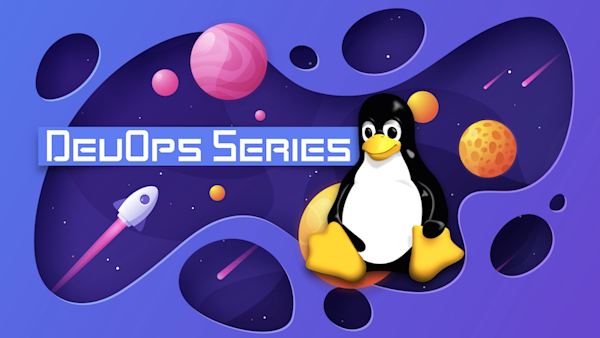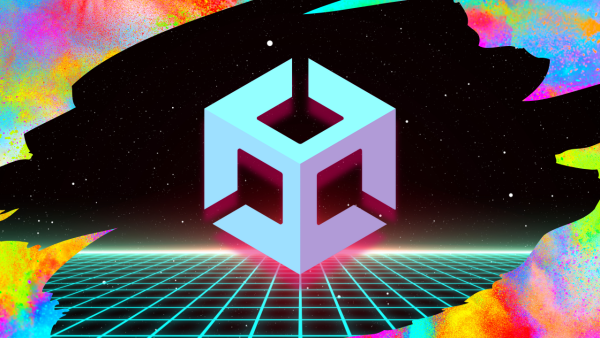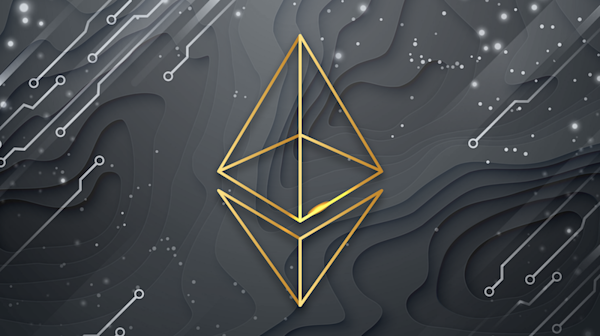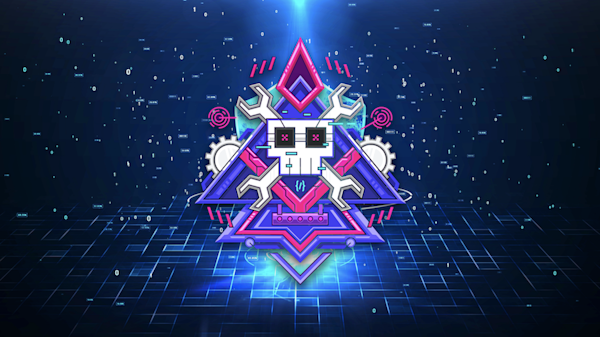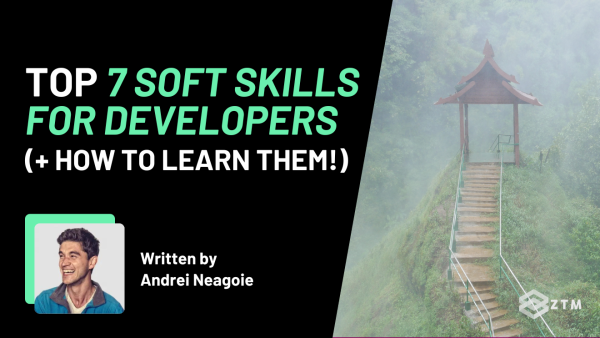Want to kick start your career in tech in 2026, but not sure which area fits you best?
Well good news!
In this guide I'm going to give you 3 ways to figure out the best option for you, as well as resources for you to learn and get hired ASAP.
So let's break them down:
You could take our tech career path quiz
If you can’t be bothered to read this guide, you can take our tech career path quiz instead. Simply click the link below:
Want a career in tech but not sure what to do?
- Find the perfect career path for you based on your experience and goals
- Get a personalized step-by-step roadmap to follow
- Go from zero to hired in your dream career
- 👇 Take our free, 2-minute quiz to make it happen
You answer some basic questions and it'll recommend the best job for you, based on your choices. Then you can follow the roadmaps it recommends to get started, pick up the skills, and get hired.
Easy right?
You could follow our 'Get hired in tech ASAP' guide
Or, if you just want to get a tech career as fast as possible so you can start making money, then follow this career path instead:
Become a I Just Want To Get Hired
14 milestones 9 courses
Step-by-step roadmap where you'll learn to code and build a portfolio.
Curated curriculum of courses, workshops, challenges, projects, and action items.
Become a I Just Want To Get Hired from scratch and actually get hired.
Earn on average per year:
$89,282
US salary data collected from Indeed, LinkedIn, and Web3.career 2026.
We've done all the research for the most popular careers, with the best job opportunities and the highest salaries so you don't have to. Based on our research, this is the best option if you want to get hired fast as a complete beginner.
Estimated time frame to learn all the skills and apply for roles is 5 months or less, and starting salary for this role is around $89,000 going up to around $129,000 after a few years or higher.
Or you can learn the best tech career for you, and choose for yourself
Otherwise, you can keep reading this guide and I’ll help you decide what the best role is for you, as well as answer some of the most common questions that you probably have.
Still here?
Alright, let's get into it. Before we break down the different tech career options, we need to get clear on something that most people don't think about, which is “What do you want your life to look like when you have this new career?”
Why ask this?
Well, I bet you've never really given it much thought, but the beauty of a new career, (especially in tech), is you can figure out what you want your dream life to be like, and then look for the roles that fit it best.
For example
Do you want to work remotely so you can work from anywhere in the world?
What about working asynchronously (different hours to other people in the company) so you get to choose the hours you work? Work around your kids etc or hobbies
Maybe you only want to do a 4-day week?
Or perhaps you’re happiest with structure and an office environment?
Maybe you want a blend of both?
Or perhaps you want a set daily routine, or a constant change each day?
All of these things can have a huge impact on your quality of life, so keep them in mind as you decide, as not every role will fit this.
You're starting a new career so you might as well pick the best one right!?
So with that out of the way, let's get into each of the roles, how they work, what they do, and who they suit best!
Option #1. Web Development
Do you enjoy tweaking recipes to make them better? Or perhaps you often find yourself devising more efficient ways to complete household chores or work tasks?
If so then you might enjoy web and software development!
Developers are the builders of the internet, designing and constructing websites, software, and apps, that are both visually pleasing and functionally effective.
They collaborate closely with UX/UI designers to help bring their designs to life and ensure they function as intended:
The designer mocks up what the site, software, or app should look like based on the project or what the client wants
Then the developer builds it so it's not just an image but a working end product
Pretty cool right?
Without getting too technical, its worth also understanding that there are 3 core types of developer:
Front-end devs work on the 'front facing' parts of the build i.e the buttons and things that people interact with
Back-end devs build all the stuff behind the scenes that make the things happen when people click those buttons
While Full-stack devs have the skills to do both front and back
Full-stack isn't actually as difficult as it sounds, as you can learn certain programming languages that let you use the same language on the front and back-end.
Its definitely more to learn, but it also pays a lot more, and it’s why we recommend all new web developers become full-stack developers (even if you mainly want to work on frontend or backend), simply because you'll then be better in either role.
Speaking of money...
Lifestyle, Salary and Benefits as a Full-Stack Developer
As of January 2026, the current average salary for a Full-Stack Web Developer on ZipRecruiter is $123,262, going up to as high as $178k in California where the largest tech companies are:
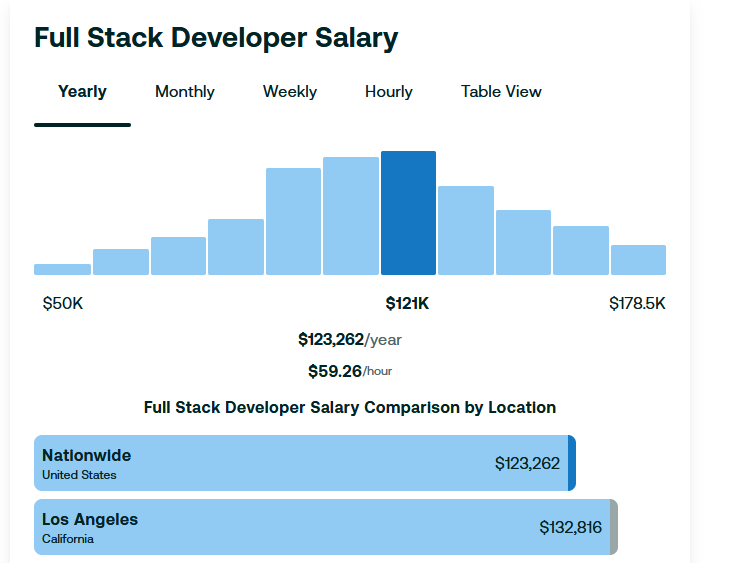
Bear in mind that this is just looking at one website and the jobs they have available. These numbers will vary based on factors like geographical location, industry, company size, and individual skills and experience.
Remember also that while salary is an essential factor in choosing a career, it's also crucial to consider your interest and enjoyment in the work, the work-life balance, and the potential for growth and learning.
So, aside from the financial compensation, web development also offers other benefits that tie into those lifestyle choices we mentioned earlier:
The field is always evolving, offering possibilities to continually learn about new tools and technologies
The flexibility in terms of working remotely or freelancing can be another major benefit, providing the possibility to create a work schedule that fits your needs
Its also one of the fastest paths into tech
Essential Skills and Education needed to become a Full-Stack Developer
The skills required for a Full-Stack Developer role include:
Strong fundamentals in HTML, CSS, and JavaScript, which are the building blocks of the web. These are essential for creating responsive, interactive user interfaces that work across devices and browsers.
Experience with front-end frameworks, such as React, which help developers build complex user interfaces more efficiently and manage application state as projects grow.
Back-end development skills, most commonly using JavaScript with Node.js. This allows developers to build servers, handle requests, and manage application logic, often using the same language across the entire stack.
Working with APIs, including designing and consuming them, so front-end and back-end systems can communicate properly. This is how real-world web applications connect user actions to data and business logic.
Solid knowledge of databases and SQL, since most applications need to store, retrieve, and update data. Understanding how databases work ensures applications remain reliable and performant as they scale.
Basic awareness of security best practices, such as handling user data safely and protecting applications from common vulnerabilities, which is critical when building production-ready software.
Working knowledge of AI-assisted development tools, including basic prompt engineering, which can help speed up development workflows, debug code, and improve productivity without replacing core programming skills.
If this sounds like the career for you (and spoiler alert, it's one of the fastest to get hired in), then check out our complete full-stack Web Developer career path below as it covers all this and more:
Become a Fullstack Web Developer
13 milestones 9 courses
Step-by-step roadmap where you'll learn to code and build a portfolio.
Curated curriculum of courses, workshops, challenges, projects, and action items.
Become a Fullstack Web Developer from scratch and actually get hired.
Earn on average per year:
$115,887
US salary data collected from Indeed, LinkedIn, and Web3.career 2026.
^^ This roadmap will teach you everything you need to know, in the correct order, so you get hired ASAP.
I'm a little biased towards this one as this is where my expertise is and how I switched to a career in tech after working for many years in the travel industry. I'll be one of your main instructors if you decide to choose this career path 😉.
Later on if you want to further specialize in mobile app design, you can also check out this roadmap:
Become a Mobile Developer
13 milestones 8 courses
Step-by-step roadmap where you'll learn to code and build a portfolio.
Curated curriculum of courses, workshops, challenges, projects, and action items.
Become a Mobile Developer from scratch and actually get hired.
Earn on average per year:
$109,976
US salary data collected from Indeed, LinkedIn, and Web3.career 2026.
Option #2. Cybersecurity
Are you the person your family or friends turn to when their computer has a virus, or their email is acting weird. Perhaps because you have a natural interest in solving these kinds of problems?
If so then a career in cybersecurity could be the perfect fit for you!
Cybersecurity professionals are the guardians of the digital world, protecting systems and data from threats and malicious attacks
However, unlike the media's often dramatic portrayal, cybersecurity isn't just about sitting in dark rooms and anonymous hackers. It's a multi-faceted field with a variety of roles that combine problem-solving, technical skills, and a relentless curiosity to protect digital assets from threats.
Because of this, cybersecurity also has several specializations:
Security Analysts are the detectives of the cybersecurity world. They constantly monitor their organization's networks for security breaches and investigate when a violation occurs
Ethical Hackers and Pen Testers (also known as white-hat hackers), are the good guys dressed in attacker’s clothing. They use their hacking skills for good, to try and hack customers systems so they can find and fix security vulnerabilities before malicious hackers can exploit them
Cryptographers focus on developing secure algorithms, ciphers, and security systems to encrypt sensitive information. This role is crucial in a world where data privacy is becoming increasingly important
While Security Architects design, build, and oversee the implementation of network and computer security for an organization. They are like the master builders of cybersecurity, ensuring a well-structured and secure architecture
Lifestyle, Salary, and Benefits of a Cybersecurity professional
The current average salary for a cybersecurity professional is $132,962, going as high as $186,000 in California:
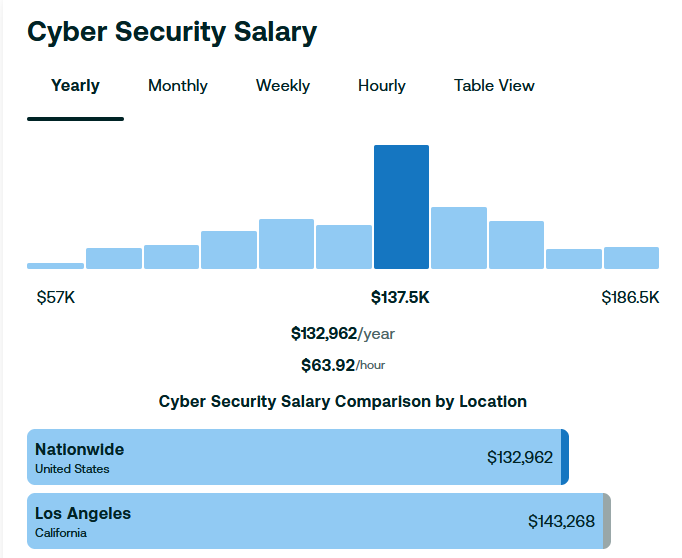
As for the actual lifestyle in the job, the majority of cybersecurity roles tend to be dynamic and fast-paced, given the rapid evolution of technology and its associated threats. (You need to be quick to respond to issues etc).
However, roles like security architects can provide a more stable and structured environment, because they focus on preventive measures and long-term security solutions. And since most cybersecurity tasks are conducted online, these roles often offer the flexibility for remote work.
It should also be noted that its very easy to pick up freelance work in cybersecurity, and their are specific industries tailored to this, such as bug bounties.
Basically, companies will list potential issues with their app, site or software. Then they will pay ethical hackers a set fee if they can figure them out, or even just find issues not listed.
While high-severity findings can sometimes pay five figures or more, bug bounties are most often used to build real-world experience and credibility early on.
Essential Skills and Education needed to become a Cybersecurity Professional
The skills required for a cybersecurity role include:
Strong foundational IT and networking knowledge, including how operating systems, networks, and protocols work. This is critical because you can’t secure systems properly unless you understand how they function under normal conditions.
Understanding of security tools and concepts, such as firewalls, intrusion detection systems, encryption protocols, and SIEM platforms. These are used daily to monitor systems, detect suspicious activity, and respond to potential threats.
Basic programming and scripting skills, most commonly in Python. Many security tools rely on scripts, and knowing how to read, modify, or write them allows you to automate tasks and better understand how attacks and defenses actually work.
Knowledge of web security and common vulnerabilities, which is especially important for ethical hackers and penetration testers. This helps you identify weaknesses in applications before malicious attackers can exploit them.
Awareness of how AI is impacting cybersecurity, both from a defensive perspective and an attacker’s perspective. As automation and AI-driven attacks become more common, security professionals need to understand how these tools change the threat landscape.
Critical thinking and problem-solving skills, including the ability to think like an attacker. Much of cybersecurity work involves anticipating how systems could be abused and finding weaknesses before someone else does.
Ongoing learning and certification readiness, since the threat landscape changes constantly. Staying up to date helps demonstrate credibility and ensures your skills remain relevant as new attack techniques emerge.
If this sounds like a career for you and you're keen on some digital cops and robbers, then check out our complete Cybersecurity career path here or read this guide for an indepth look.
Become a Ethical Hacker & Cybersecurity Expert
15 milestones 12 courses
Step-by-step roadmap where you'll learn to code and build a portfolio.
Curated curriculum of courses, workshops, challenges, projects, and action items.
Become a Ethical Hacker & Cybersecurity Expert from scratch and actually get hired.
Earn on average per year:
$126,653
US salary data collected from Indeed, LinkedIn, and Web3.career 2026.
Again, this will teach you the exact steps in the right order so you can become a cybersecurity professional, or continue on to be an ethical hacker.
Option #3. Machine Learning and AI
If you're someone who enjoys strategic games, predicting outcomes based on past behavior, or if you're fascinated by the idea of teaching machines to learn from data, then a career in Machine Learning or AI could be a great fit.
While Machine Learning and AI are technically separate fields, they have a huge amount of overlap in how they work and what you need to learn, so for simplicity, we’ll cover them together here. (Some companies will even interchange the role and responsibilities, though this can vary depending on the company).
At a high level, the core roles look like this:
Machine Learning Engineers build and manage models that learn from data patterns to make predictions or decisions without being explicitly programmed.
AI Engineers apply machine learning and deep learning techniques to build systems that perform tasks typically associated with human intelligence, such as language understanding, vision, or decision-making.
In practice, the skills and tools used in both roles overlap heavily, which is why they’re often taught and hired for together.
Lifestyle, Salary, and Benefits of an AI or Machine Learning Engineer
Both roles pay very well, and can vary depending on the company and your other skills:
The average salary for a Machine Learning Engineer (or AI Engineer) is $128,769 going as high as $193,000 in California:
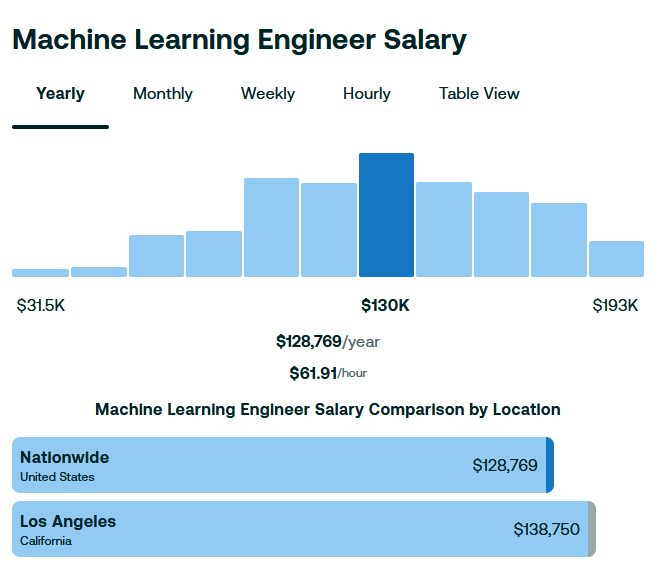
(Editor's note: That being said, that's just for this one job hosting website. When we aggregated across multiple platforms we saw an average of $195,000).
As for the lifestyle and benefits, its fairly similar to other tech roles.
Because they're all emerging industries, each of them are very fast paced, so you'll definitely always be learning something new. However, they will often offer remote or hybrid work options.
Essential Skills and Education needed to become an AI or Machine Learning Engineer
The skills required for an AI or Machine Learning Engineer role include:
Strong programming skills, especially in Python, which is the primary language used for building, training, and deploying machine learning models. This is essential because most ML and AI work involves writing production-ready code, not just experimenting.
A solid understanding of data, statistics, and modeling, including how data is prepared, analyzed, and used to train models. These skills matter because machine learning systems are only as good as the data and assumptions behind them.
Experience with machine learning frameworks, such as TensorFlow or PyTorch, which are used to build, train, and evaluate models at scale.
Experience working with modern ML tooling and model ecosystems, such as using pre-trained models and libraries like Hugging Face. This matters because real-world ML work often involves adapting and fine-tuning existing models rather than building everything from scratch.
Knowledge of algorithms and model behavior, including how models learn, where they can fail, and how to evaluate performance. This helps engineers choose the right approach for a given problem and avoid misleading results
Understanding of full ML workflows, including data cleaning, model evaluation, and preparing models for deployment
Strong problem-solving and analytical thinking skills, since much of the work involves experimenting, debugging models, and iterating when results don’t behave as expected.
A mindset of continuous learning, as AI and machine learning tools evolve rapidly and engineers need to stay up to date to remain effective.
Working knowledge of Prompt Engineering, which can dramatically improve how you interact with large language models. While it’s not a replacement for core ML or AI skills, it can help speed up experimentation, improve outputs, and get more value from modern AI tools.
Become a AI & Machine Learning Engineer
17 milestones 12 courses
Step-by-step roadmap where you'll learn to code and build a portfolio.
Curated curriculum of courses, workshops, challenges, projects, and action items.
Become a AI & Machine Learning Engineer from scratch and actually get hired.
Earn on average per year:
$195,425
US salary data collected from Indeed, LinkedIn, and Web3.career 2026.
Option #4. UI and UX Design
Do you ever geek out when you're on a website or an app, and everything just flows really easily. Simply because you can figure out exactly how everything works without even thinking about it?
Likewise, does it really frustrate you when you're using a streaming platform and you have to click through 12 steps just to do a search, and all the images are a mess?
If so, then a role in design might be perfect for you!
Design within the tech industry is much more than just making things look good. It's about creating user interfaces that are not only aesthetically pleasing but also functional, intuitive, and accessible.
In its simplest form, a tech designer's role (most commonly known as a Product Designer or UX/UI designer) involves creating the interfaces through which users interact with software, applications, or websites. Whether it's the layout of a website or the navigation menu on an app, designers are the ones who establish how these platforms look and function.
Lifestyle, Salary, and Benefits of being a UI/UX Designer
Again, as of January 2026, the current average salary for a UI/UX Designer on ZipRecruiter is $106,000 with some roles in California paying $171k:
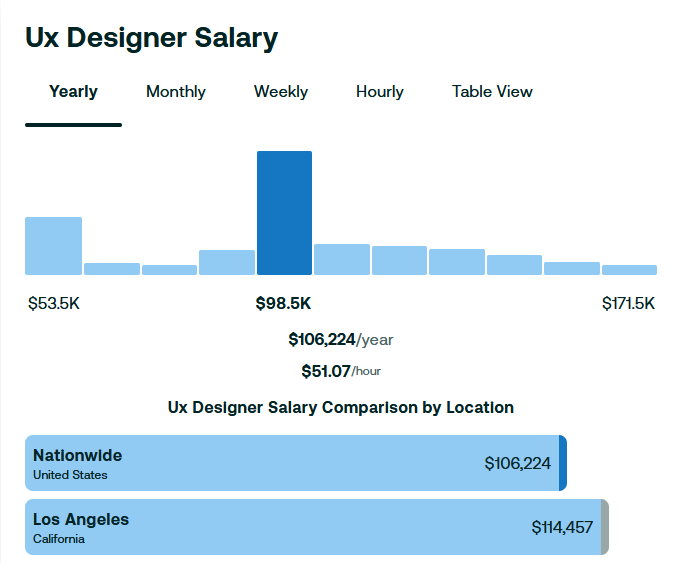
Not bad, but what about the lifestyle?
Like all jobs, it can depend on the company. Designers in startups and tech companies, where product iterations are frequent are pretty fast-paced. However, if you work in larger corporations then you can expect a more balanced and stable work schedule.
As for location, the ability to work remotely is a common perk in design roles, providing the flexibility to shape your workday around your life, rather than the other way around, meaning you can also be async.
Essential Skills and Education needed to become a UI/UX Designer
The skills required for a UI/UX Designer role include:
Proficiency with modern design tools, such as Figma, Sketch, or Adobe XD, which are used to create wireframes, prototypes, and high-fidelity designs that communicate how a product should look and behave.
Strong understanding of UX principles and user research, including gathering insights, testing designs with real users, and iterating on feedback to improve usability and flows.
Experience with wireframing, prototyping, and interaction design, allowing designers to quickly explore ideas, validate assumptions, and refine solutions before development begins.
Knowledge of accessibility and inclusive design practices, ensuring products are usable by as many people as possible and meet modern accessibility standards.
Familiarity with design systems and component-based design, which helps teams maintain consistency and scale products efficiently across features and platforms.
Basic understanding of how the web works, including layout, responsiveness, and common front-end constraints. This helps designers create interfaces that are realistic to build and collaborate more effectively with developers, without needing to write production code themselves.
Ability to collaborate with developers, product managers, and stakeholders, clearly communicating design decisions and handing designs off for implementation.
Strong visual and communication skills, combining attention to detail with the ability to explain and defend design choices.
A portfolio-driven mindset, since UI/UX roles are typically hired based on demonstrated projects and real-world design work rather than formal qualifications.
If this sounds like the career for you and you're itching to flex your creative muscles, then check out our complete UI/UX Designer career path with the link below or read this guide.
Become a UI/UX Designer
12 milestones 7 courses
Step-by-step roadmap where you'll learn to code and build a portfolio.
Curated curriculum of courses, workshops, challenges, projects, and action items.
Become a UI/UX Designer from scratch and actually get hired.
Earn on average per year:
$109,533
US salary data collected from Indeed, LinkedIn, and Web3.career 2026.
Again, the roadmap will teach you everything you need to know, in the correct order, as well as provide all the training so you can get hired ASAP.
Option #5. Business and Data Analytics
If you're intrigued by numbers and patterns, enjoy digging into data, and like the idea of helping businesses make better decisions, then a career in Business and Data Analytics could be a great fit.
This area of tech focuses on turning raw data into insights that teams can actually use. While there are several roles within this space, they all share a common foundation and often overlap, especially early on in a career.

Business and data professionals work with large datasets to uncover trends, measure performance, and answer important business questions. They clean and organize data, analyze it from different angles, and communicate what it means to stakeholders across the company.
At a high level, the most common roles in this space include:
Business Intelligence (BI) Analysts, who focus on dashboards, reporting, and tracking key business metrics so teams can monitor performance and make informed decisions.
Data Analysts, who work more directly with data to explore patterns, analyze behavior, and generate insights that guide product, marketing, or operational decisions.
Data Scientists, who take things a step further by using advanced statistics and machine learning techniques to build predictive models and forecast future outcomes.
While these roles differ in scope and complexity, they share many of the same core skills. Most people enter this field through Business Intelligence or Data Analyst roles, then specialize further as they gain experience.
(Check out this guide if you want to go deeper into the differences between common data roles).
Lifestyle, Salary, and Benefits of being a Data Analyst or Data Scientist
Careers in business and data analytics tend to offer a more structured and predictable workday compared to some other tech roles, with regular hours and clearly defined projects.
The average salary for a Data Analyst is $82,640, with roles in California reaching $136,500. While Data Scientists earn more on average, with salaries around $122,738 and senior roles reaching $195,000+.
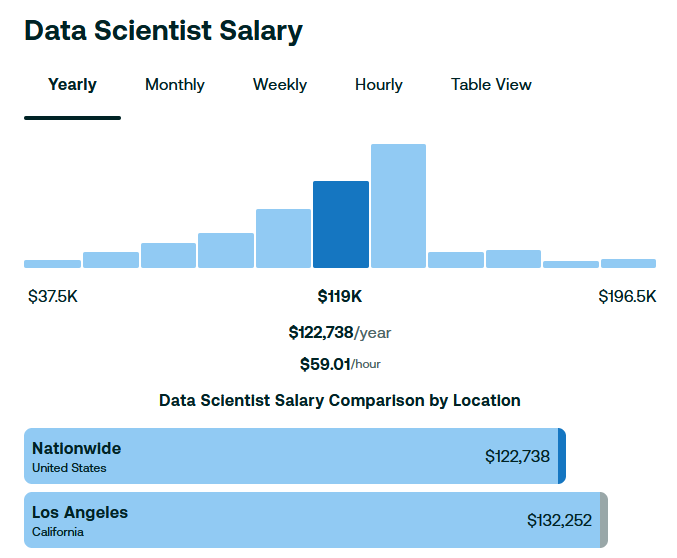
Remote and hybrid work is very common in this field, and demand for data skills remains high across industries, making analytics a stable and flexible career choice.
Essential Skills and Education need to work in Data Analysis
The skills required for roles in business and data analytics include:
Strong analytical and problem-solving skills, since the core of the job is turning messy, real-world data into clear, actionable insights.
Proficiency with SQL, which is used to query databases and extract the data needed for analysis in almost every analytics role.
Comfort working with spreadsheets, such as Excel and VBA for quick analysis, validation, and reporting, especially in business-focused roles.
Experience with data visualization tools, like Power BI or Tableau, which help transform numbers into dashboards and reports that non-technical stakeholders can understand.
Working knowledge of Python, which is commonly used for deeper analysis, automation, and more advanced statistical work, particularly in Data Analyst and Data Scientist roles.
Understanding of statistics and data interpretation, allowing analysts to identify trends, spot anomalies, and avoid misleading conclusions.
Strong communication skills, since insights are only valuable if they can be clearly explained to business leaders, product teams, and non-technical audiences.
As roles become more advanced, particularly in Data Science, additional skills like machine learning and predictive modeling become more important. However, these are typically built on top of the same foundational analytics skills.
If a career in unlocking insights behind the numbers, or making predictions with ML models sounds good to you, then check out our Data-related career paths via the links below:
Become a Business Intelligence Analyst
14 milestones 11 courses
Step-by-step roadmap where you'll learn to code and build a portfolio.
Curated curriculum of courses, workshops, challenges, projects, and action items.
Become a Business Intelligence Analyst from scratch and actually get hired.
Earn on average per year:
$96,337
US salary data collected from Indeed, LinkedIn, and Web3.career 2026.
Option #6. Data Engineering
Alternatively, if you enjoy working behind the scenes rather than working directly on dashboards or models, then a career as a Data Engineer could be a great fit.
Data Engineers are responsible for building and maintaining the data infrastructure that companies rely on. They design systems that collect data from many sources, transform it into a usable format, and store it so that analysts, data scientists, and machine learning systems can actually use it.
Instead of answering business questions directly, Data Engineers focus on making sure the data is accurate, available, and delivered at scale.
In many ways, they make all other data roles possible.
Lifestyle, salary, and benefits of a Data Engineer
Data Engineers are consistently among the highest-paid roles in the data space. The average salary for a Data Engineer is $129,716 going as high as $177,500 in California:

From a lifestyle perspective, data engineering work tends to be structured and project-based, so you’ll often work on pipelines, infrastructure upgrades, or system improvements rather than ad-hoc analysis, which makes the role more predictable than some other data jobs.
However, because most of the work is cloud-based, it does mean that remote and hybrid roles are very common.
Essential skills and knowledge needed to become a Data Engineer
The skills required for a Data Engineer role include:
Strong programming skills, most commonly in Python, which is widely used for building data pipelines, automating workflows, and integrating systems. Data engineers spend a lot of time writing and maintaining production-level code, not just one-off scripts.
Solid knowledge of SQL and databases, since data engineers design how data is stored, queried, and accessed. Understanding how databases work under the hood helps ensure data remains fast, reliable, and scalable as volumes grow.
Experience with data pipelines and workflows, including how data is ingested, transformed, and moved between systems. This is important because real-world data is often messy, late, or incomplete, and pipelines need to handle failures gracefully.
Familiarity with cloud platforms and distributed systems, such as data lakes, data warehouses, and large-scale processing frameworks. These skills allow data engineers to build systems that can handle millions or billions of records without breaking.
Working knowledge of tools like Excel and Power BI, which helps data engineers validate data, understand reporting requirements, and collaborate more effectively with analysts and business teams, even if they’re not responsible for building dashboards themselves.
Strong problem-solving and systems thinking, as much of the role involves diagnosing bottlenecks, improving performance, and making trade-offs between cost, speed, and reliability.
All of which are covered in the career path below:
Become a Data Engineer
12 milestones 9 courses
Step-by-step roadmap where you'll learn to code and build a portfolio.
Curated curriculum of courses, workshops, challenges, projects, and action items.
Become a Data Engineer from scratch and actually get hired.
Earn on average per year:
$178,769
US salary data collected from Indeed, LinkedIn, and Web3.career 2026.
If you want to build robust systems, work with both code and data, and want a role that sits at the core of modern analytics and AI, then the Data Engineer is one of the most in-demand roles in tech today.
Option #7. DevOps
If you're someone who likes to automate tasks to save time (like using smart home devices to control your household appliances), then you might find a career in DevOps appealing:
DevOps engineers are responsible for overseeing both the development and the IT infrastructure of a company.
Their role is to facilitate communication between the traditionally siloed development and IT operations teams (Dev and Ops) and ensure the efficient deployment, operation, and monitoring of the software.
In simple terms, if you're a DevOps engineer, you're sort of like a translator between two foreign language speakers (the developers and the IT staff). You ensure they understand each other and work together smoothly, to get the project completed.
If you’re the person who made sure the group project got over the line and was still sane afterward, then this is definitely a great career option for you.
Lifestyle, Salary and Benefits of a DevOps Engineer
The current average salary for a DevOps Engineer is $125,908, going as high as $179,000:
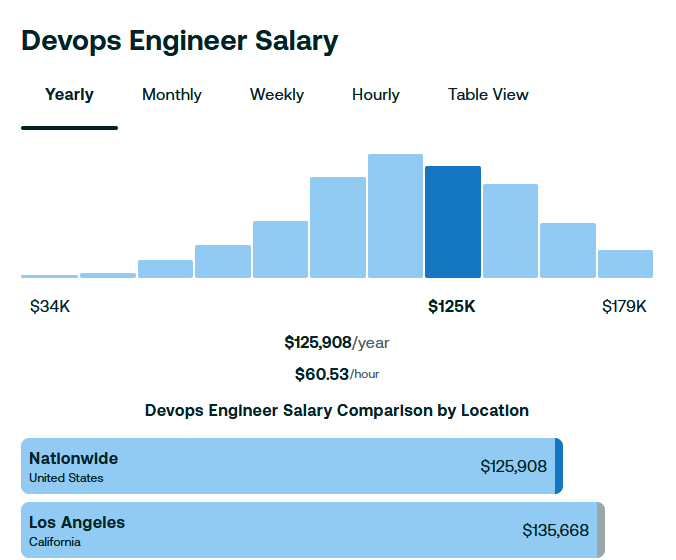
When it comes to lifestyle, DevOps careers can be quite dynamic and fast-paced. The tech industry is constantly advancing, meaning you'll often be learning and adapting to new tools and practices.
For example
A lot of devices have moved to the cloud in recent years, so being proficient in this also is a key skill.
However, DevOps also offers some sense of structure, especially when working in larger organizations with established DevOps cultures. Being at the intersection of several teams (such as development, IT operations, and quality assurance), these roles offer ample opportunities for collaboration and continuous learning.
Remote work is also common in DevOps, making it possible to enjoy a flexible and location-independent lifestyle. (Easier to be remote and communicate with multiple teams than all be on location).
Additional benefits common in this role include professional development opportunities, comprehensive health benefits, and work flexibility.
Essential Skills and Education needed to become a DevOps Engineer
The skills required for a DevOps Engineer role include:
Strong foundations in Linux and operating systems, since DevOps engineers work closely with servers, environments, and infrastructure where Linux is the dominant platform.
Programming and scripting skills, commonly using languages like Python along with Bash, and Node.js, which are used to automate tasks, build tooling, and manage CI/CD workflows rather than writing full application code.
Experience with cloud platforms, such as AWS or Google Cloud, because modern infrastructure is increasingly cloud-based and DevOps engineers are responsible for deploying and maintaining systems at scale.
Understanding of Infrastructure as Code (IaC) tools like Terraform or Ansible, which allow infrastructure to be defined, versioned, and managed through code rather than manual configuration.
Knowledge of CI/CD pipelines, including how code is automatically built, tested, and deployed. This is central to DevOps, as it enables teams to release software faster and more reliably.
Familiarity with containers and containerized applications, including tools like Docker and orchestration concepts, which help teams package, deploy, and scale applications consistently across environments.
Monitoring, logging, and reliability practices, ensuring systems remain healthy, performant, and observable, and that issues can be detected and resolved quickly.
Working knowledge of networking, databases, and security fundamentals, which helps DevOps engineers troubleshoot issues and design more resilient systems.
Strong collaboration and communication skills, since DevOps engineers work across development, operations, and business teams to improve workflows and reduce friction.
If the thought of planning and organizing gives you that dopamine, then check out our step-by-step DevOps Engineer career path here or read this guide for a deep dive.
Become a DevOps Engineer
17 milestones 14 courses
Step-by-step roadmap where you'll learn to code and build a portfolio.
Curated curriculum of courses, workshops, challenges, projects, and action items.
Become a DevOps Engineer from scratch and actually get hired.
Earn on average per year:
$141,226
US salary data collected from Indeed, LinkedIn, and Web3.career 2026.
Option #8. Game Design Development
If you've always been mesmerized by the immersive worlds of video games, then learning how to make them might just be the best career path for you!
Game design (aka game development) encompasses both artistic and technical aspects, blending coding and design, along with strategy and psychology.
As with all areas in tech, the specific tasks will depend on your role and where you focus:
Level Designers create the virtual landscape where the game takes place, from map designs to placement of obstacles, enemies, or power-ups. It's like being an architect and urban planner for a virtual world
Character Designers are responsible for creating and designing the characters that populate the game world. This often involves drawing and animating characters, defining their abilities, and sometimes even their backstories
Gameplay Designers balance the rules and mechanics that govern how the game is played. They're responsible for creating a fun, engaging, and accessible experience for players
While Storyline Writers create the narrative that drives the game. This includes writing dialogue, creating plotlines, and ensuring the story integrates seamlessly with gameplay
Lifestyle, Salary, and Benefits of a Game Developer
The current average salary on ZipRecruiter for a Game Developer is $108,471, going up to as high as $180,000 in California:
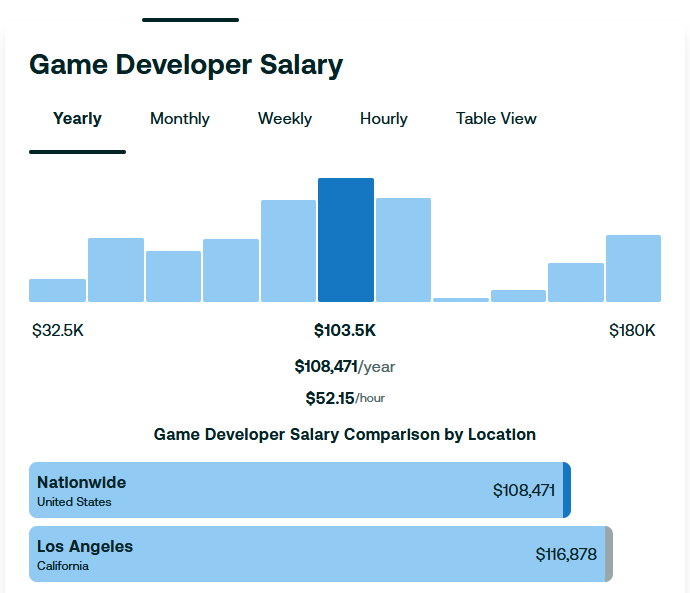
Pretty good right!?
But what about the work and benefits?
Well I wont lie, the lifestyle of a game designer can be dynamic and fast-paced, especially when working towards a game release and you do hear nightmares at some companies. However, for most companies the work is structured, with clear milestones and deliverables to meet.
Plus, many game design roles are remote-friendly, offering the flexibility to work from anywhere, or even get paid to play and test the games!
Essential Skills and Education needed to become a Game Developer
The skills required for a Game Developer role include:
Strong understanding of game design principles, including mechanics, player feedback loops, and balance. These concepts define how a game feels to play and whether it’s engaging over time.
Experience working with a game engine, most commonly Unity, which is used to build game worlds, manage assets, handle physics, and bring gameplay systems to life.
Programming skills, particularly using C#, which is used in Unity to control gameplay logic, character behavior, interactions, and game systems.
Knowledge of gameplay systems and mechanics, such as movement, collisions, physics, scoring, and progression, which form the foundation of most games.
Familiarity with working with assets, including models, animations, audio, and scenes, and understanding how to integrate them into a playable game.
Basic experience with 3D and interactive graphics, such as using libraries like Three.js, which can help developers understand real-time rendering concepts and build interactive experiences outside traditional game engines.
Debugging and problem-solving skills, since game development involves testing, fixing bugs, and refining performance to ensure smooth gameplay.
Basic understanding of performance and optimization, especially as games grow in complexity and need to run smoothly across different devices.
Working knowledge of , which can help speed up prototyping, generate placeholder assets or dialogue, and improve iteration when using modern AI tools, without replacing core game development skills.
A portfolio-driven mindset, as game developers are typically hired based on playable projects and demos rather than formal qualifications.
If you want to build the next blockbuster hit, then check out the roadmap below:
Become a Game Developer
10 milestones 8 courses
Step-by-step roadmap where you'll learn to code and build a portfolio.
Curated curriculum of courses, workshops, challenges, projects, and action items.
Become a Game Developer from scratch and actually get hired.
Earn on average per year:
$99,039
US salary data collected from Indeed, LinkedIn, and Web3.career 2026.
Just like with our other roadmaps, this will show you the right things to learn in the right order, so you can skill up and get hired ASAP.
Option #9. Web3 and Blockchain
Do you find yourself intrigued by economics, digital currencies, the idea of decentralization, and the future of how the internet works?
If so, then the field of Web3 and Blockchain could be a perfect fit for you.
Most people when they think of blockchain, think of cryptocurrency which is a shame. Yes crypto is important, but it's the technology behind how this works that's even more interesting.
In fact, it's so groundbreaking, it’s being termed as the 3rd version of the internet or ‘Web3’:
Web1 refers to the early stages of the internet, where users could merely browse content and had little to no interaction
Then came Web2, the era of social networks, user-generated content, and data collection, which is where we currently stand
Now, we are transitioning to Web3, aiming to create a decentralized internet where users regain control over their data
It’s still early days and who knows where it could all go but it's incredibly interesting.
Anyways, there are a few key roles in this field:
Blockchain Developers are the architects of the blockchain universe. They create blockchains, which are essentially decentralized databases that record transactions. The blockchain technology powers cryptocurrencies like Bitcoin and Ethereum, and it's also used in various other sectors like finance, supply chain, healthcare, and more
Smart Contract Developers work specifically with smart contracts, which are self-executing contracts with the agreement directly written into code. A popular language for writing smart contracts is Solidity, which is used in the Ethereum blockchain
DApp Developers focus on creating decentralized applications (DApps) that run on a P2P network of computers rather than a single computer. DApps are a staple in the Web3 world, as they offer a more secure and robust platform for users to interact with each other directly
Don’t worry about trying to understand all that just yet. For now, just know it's trying to be the future of the internet (or maybe it won't... time will tell).
If you want to be a part of that potential, this could be the career for you.
Lifestyle, Salary, and Benefits of a Blockchain Developer
The current average salary for a Blockchain Developer is $111,845, going as high as $166,500:
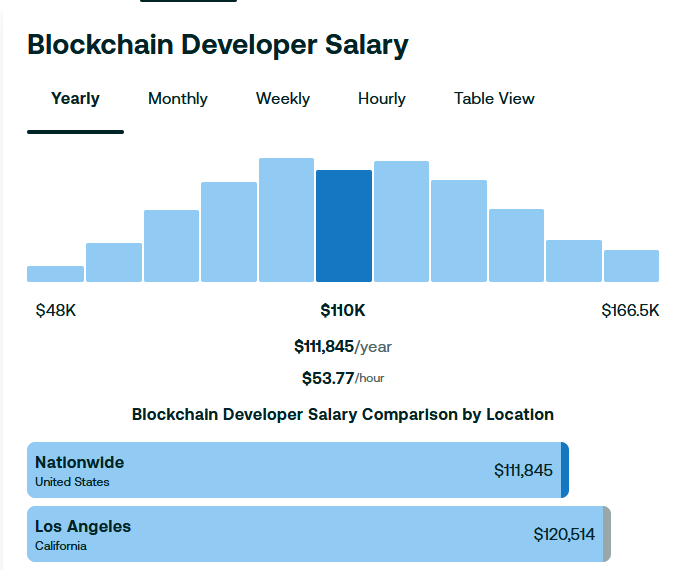
As for the lifestyle, the Web3 and Blockchain space is incredibly entrepreneurial and innovative. It's also a relatively new field, which means it's continuously evolving, with new projects, opportunities, and challenges emerging all the time, so you'll always be learning.
Although there are currently fewer companies in this space compared to more established tech sectors, the demand for experts in this niche is on the rise, so you can be classified as an ‘experienced’ Solidity dev in just a few years.
And like most tech roles, it offers the flexibility to work remotely - a feature that many blockchain companies take advantage of to hire the best talent from around the globe. In fact, a lot of them have a ‘remote first’ approach.
Essential Skills and Education needed to become a Blockchain Developer
Getting into Web3 and Blockchain requires:
A solid understanding of blockchain fundamentals, including decentralization, distributed ledgers, transactions, and how blockchains differ from traditional databases.
Knowledge of Ethereum and how it works, since it is the most widely used platform for building smart contracts and decentralized applications.
Proficiency with Solidity, the primary programming language used to write smart contracts on Ethereum, which define how blockchain-based applications behave.
Working knowledge of JavaScript, which is commonly used to interact with smart contracts, build front ends for decentralized applications, and connect users to the blockchain.
Understanding how decentralized applications (DApps) work, including wallets, transactions, and real-world use cases such as token-based apps or NFTs, without needing to specialize in any single application area.
Awareness of smart contract security principles, since vulnerabilities in blockchain code can be costly and difficult to reverse once deployed.
Experience deploying and testing smart contracts, which helps ensure contracts behave as expected before being released to live blockchain environments.
Strong problem-solving and critical thinking skills, as the Web3 ecosystem evolves quickly and often requires adapting to new tools and standards.
A portfolio-driven mindset, since blockchain developers are typically hired based on hands-on projects and demonstrable experience rather than formal education.
If the concept of digital currencies, smart contracts, and decentralized applications (DApps) excites you, then check out our complete Blockchain Developer career path below.
Become a Blockchain Developer
13 milestones 7 courses
Step-by-step roadmap where you'll learn to code and build a portfolio.
Curated curriculum of courses, workshops, challenges, projects, and action items.
Become a Blockchain Developer from scratch and actually get hired.
Earn on average per year:
$167,893
US salary data collected from Indeed, LinkedIn, and Web3.career 2026.
Frequently Asked Questions
By now you should have an idea of what career you want, but possibly have some final niggling questions, so let's cover them.
Isn't AI replacing all the tech jobs? Is it still worth getting a career in tech?
No, AI wont steal your job, and yes, it's definitely still worth learning to code.
Without going into too much detail (that guide covers it all), AI tools are simply allowing people to automate and streamline their work, while also helping them to improve their output.
And that's where the threat is. It's not the tools stealing your job - it's the people who can use these tools also that will be in higher demand.
The tools can only do a rough approximation and help with coding (or other tasks), but it still needs a human element to make sure it works, and to think outside of the box. That's why we're so focused on teaching people how to use AI tools alongside their career paths here.
Am I too old to get into tech?
Nope!
We shared this before, but some people learn in their 80s, and you can literally learn to do this in 5-12 months, and change the rest of your entire life.
Sure, it's extra work now to learn and get started, but just take a second to do the math on the impact it could have for you.
In your 60s? Even if you have 5 years left at work, the change in salary for those 5 years could be hugely different. (Not to mention but working from home on a laptop is so much easier to do, and can push back your retirement if you wanted to).
In your 40s? 10-20 years of work in tech would be absolutely life changing. A $100,000 a year job would be $2 million dollars!
That's not even taking into account how many promotions and pay rises you will get in that time. Get to an L5 position and that can be $250,000+ a year.
In your 30s? It might seem like this is something you wished you picked up as a kid, but the reality is, that it's never too late. The only real loss is if you stayed in the same place for the next 20-30 years, on the same salary.
Don’t I need a Computer Science degree to get a job in tech?
Nope! Tech is a unique environment in that 99% of companies don’t care about degrees - they just care that you can do the work.
Sure, there are exceptions for certain roles, especially very senior ones, but in terms of first breaking into tech and get started, it's absolutely not required. Instead, all you need to do is the learn the skills needed to do the job and be able to prove that you can do them.
Online Computer Science Degree
15 milestones 13 courses
Learn all the modern skills of a Computer Science graduate + more!
Dive into different fields like Web Development, AI & Machine Learning, Data Science, Database Administration and Ethical Hacking
Get your online computer science degree and actually get hired
Earn on average per year:
$110,293
US salary data collected from Indeed, LinkedIn, and Web3.career 2026.
If you do this, you can get hired in a tech role in the next 4-12 months.
I won't sugarcoat it though. It's easier said than done. If it were super easy, then everyone would do it and then these careers wouldn't pay as well as they do. To land a career in tech, you'll have to put in a lot of work but simply working hard doesn't guarantee anything either.
You need to work hard on the right things. Which is what our career paths and courses have provided to 1,000s of people who have been hired at places like Amazon, Tesla, Google, NVIDA, NASA, and more, so don’t let this stop you.
As long as you learn the right things, you can start working towards your new career by the end of this guide - with no degree or $100,000+ in debt required!
So which will you choose?
Picking a brand new career can definitely be overwhelming, but hopefully this guide has helped you understand the main tech roles a little better and help you decide which one could be the best fit for you.
Feel free to read through this guide a few times before you decide, and remember, there's no right or wrong choice - only what aligns best with your life goals and interests.
Leverage your natural interests and skills, and remember that every step in your journey counts towards your overall growth and success in the tech world.
And if you still not sure, give our tech career path quiz a go. It'll help you narrow it down in just a few questions:
Want a career in tech but not sure what to do?
- Find the perfect career path for you based on your experience and goals
- Get a personalized step-by-step roadmap to follow
- Go from zero to hired in your dream career
- 👇 Take our free, 2-minute quiz to make it happen
P.S.
Throughout this guide, I’ve shared multiple links to different career paths and courses that you can follow to get started right now.
What you might not know is that all of these are included in a single Zero To Mastery membership. This means that if you decide to become a member of Zero To Mastery, you'll have instant access to every course and career path in our library.
So you can start one career path, and if you don’t like it, jump across to a different one!
Or you can follow them through to get hired in your new tech career, and then skill up even further to more senior and higher-paying roles (just like fellow ZTM alumni Hiren has by getting hired in a Senior role at NVIDIA after a number of years in the industry).
The best part is that when you join, you'll have access to our private Discord community, where you can ask questions and get answers from each course instructor, other students, and working professionals in your desired career.
So what are you waiting for?
Check out any of our courses and career paths now via the links above.
Best articles. Best resources. Only for ZTM subscribers.
If you enjoyed this post and want to get more like it in the future, subscribe below. By joining the ZTM community of over 100,000 developers you’ll receive Web Developer Monthly (the fastest growing monthly newsletter for developers) and other exclusive ZTM posts, opportunities and offers.
No spam ever, unsubscribe anytime







